I'm posting this during the coronavirus shutdown of 2020. I hope you are all keeping well and safe.
As a London tour guide I'm no good to anyone – least of all myself – if I'm cooped up inside.
So until such time as it's safe and responsible to see you again on my guided tours, I'll be moving my guiding efforts online - here on The Daily Constitutional and on my social media channels…
Click the buttons to keep in touch with me and for London-related content…




I had a couple of requests yesterday from friends and clients on social media for "fun facts" and quizzes, etc, to keep us all occupied as we stay at home. Earlier this week I recommended a few London books. Today I'm moving onto music (my favorite topic) and movies…
Today I'm posting a longer-than-usual read. My mission: to convince you of the genius of one of my musical heroes, the great LIONEL BART.
The 1968 movie version of Lionel Bart's Oliver! is the perfect way to begin.
My favorite scene… You Gotta Pick a Pocket or Two!"
Speaks for itself, no?
Alrighty then…
Here are 10 Reasons Why Songwriter Lionel Bart Is My Hero…
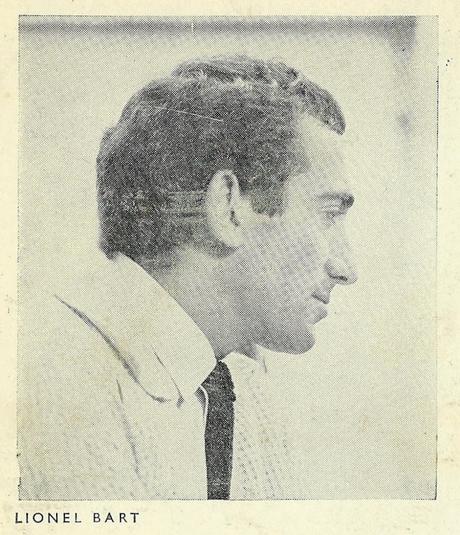
Lionel Bart pictured in 1962 on the sleeve of Blitz!
• East Ender, True Londoner
Lionel Bart’s trajectory seems nigh-on a fairy tale today.
He was born Lionel Begleiter in Stepney in 1930. His Galacian Jewish parents had fled the pogroms. Galacia, then part of the Austrian Empire, now forms part of modern-day Ukraine. A talented artist (he was a scholarship boy at St Martin’s School of Art) and an autodidact musician, from humble beginnings he rose to the very top of England’s post-war creative establishment.
• Oliver!
Oliver! opened at the New Theatre in the West End (now named the Noel Coward Theatre) in 1960. It remains his most famous show, ran for 2618 performances and has enjoyed three successful, star-studded revivals since then. But regardless of who plays the show-stealing role of Fagin, the songs and the lyrics remain the stars of any production.
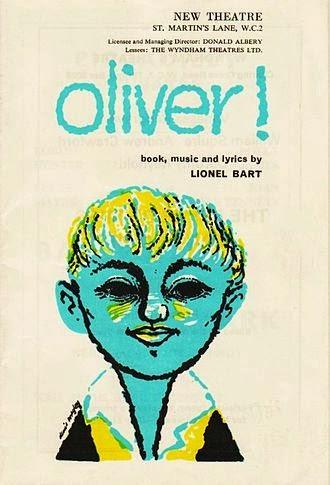
You’ve Got To Pick A Pocket Or Two, I’d Do Anything, Where Is Love?, It’s a Fine Life, Consider Yourself… a banquet of memorable tunes as rich as the repast envisioned in the opening number, Food Glorious Food.
Witty words, too:
Peas pudding and saveloys – what next is the question? Rich gentlemen have it boys: in-di-gestion!
But it's not all about the clever-clever rhymes. On As Long As He Needs Me, Dickens’s simple London girl Nancy is unencumbered by fancy rhymes. Bart’s plain speaking love song is totally in service to the character. Even the great Sondheim, as a young lyricist on West Side Story, made this mistake – his equally simple Maria is almost buried in flashy lyrics. And Sondheim was trained and influenced by the best. Bart knows instinctively when it is right to show off with language and when to rein it in. The gift of a true Cockney.
And let’s not forget the sleeping partner, here: C. Dickens. Surely a composer can’t go wrong when borrowing from such a book? Think again. Back in the 60s, a musical of Truman Capote’s Breakfast at Tiffany’s failed to survive previews on Broadway; closer to home, the musical of Tess of the D’urbervilles flopped spectacularly. Good source material: awful musicals.
Bart and Dickens collaborate seamlessly. Bart comes neither to bury Dickens with his music nor praise him with reverence. Bart’s chutzpah in approaching the project as Dickens’s equal is VERY East London: it boldly announces we're as good as anyone so don't mess.
This delicious brashness flavours the entire work. But more important than that is empathy. Empathy is the key to the success of Oliver!: both Dickens and Bart loved London. Both men experienced tremendous poverty here. It is the perfect collaboration.
Oliver! took 23 curtain calls on its opening night.
• The Sheer Energy & Drive of The Man
Music, book and lyrics ALL.
An egomaniac?
I would jolly well think he was.
A force of nature? Well that comes over clearly in the work. Only a boy running from the very real specter of poverty could travel at such a lick and achieve so much along the way. Where are the 21st Century Lionel Barts in a show business establishment that seems, like our political stage, to be peopled with the privileged?
• He Started The OTHER British Invasion
Oliver! was the first modern British musical to be a hit on Broadway.
It was already a hit when The Beatles arrived to play Ed Sullivan. The Beatles' impact on American popular music was, of course, instant. Bart’s was more of a slow-burning revolution. In Bart’s wake it was the pop-influenced composers such as Lloyd-Webber and Rice who grew to dominate the world of the musical by the 1980s. Bart was the pioneer. And he had to surmount greater obstacles than his Liverpudlian counterparts. The Fabs, let’s be honest, met with very little resistance on the bland American pop charts of 1963. Bart, however, had to hold his own in a golden age with the likes of Rodgers and Hammerstein.
• Self Taught Pop Music Genius
I never think of Lennon and McCartney as composers without thinking of Lionel Bart. Together they are the giants of mid-20th Century British popular song. We still exist in their shadows today. That all three were autodidacts only adds to their legend.
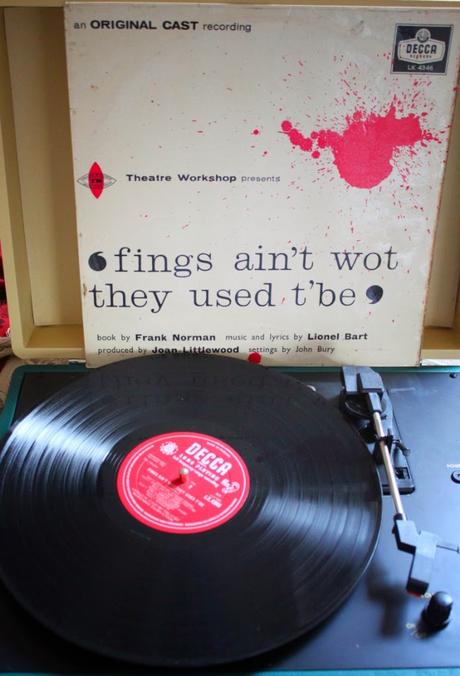
• Fing’s Ain’t Wot They Used T’be
Harder to love than Oliver! but a classic in its own right, Fings Ain’t Wot They Used T’be (1959) was staged at the Theatre Royal Stratford under the auspices of the great Joan Littlewood. More a play with music than a traditional book musical, Fings… transferred to the Garrick and ran for 886 performances. The piece brought the Cockney accent to the West End in all its profane glory in a way that was neither patronizing nor stagey. This is Brecht & Weill and John Gay through the picaresque prism of a blitzed and battle-calloused East End. Please sir, can we have a National Theatre revival?
• The Rise and Fall
Hollywood wouldn’t dare make it up. From somewhere beneath rags to beyond riches, from Stepney to Kensington. The rise is exhilarating. There’s also the crucial fall from grace that allows the Greek chorus to chime, “I told you so” at the Icarus fate of ambition on such a visible scale. “He didn’t,” they tut, “fulfill his potential.”
Fulfill his potential! He wrote Oliver!! In this alone he fulfilled the potential of 10 composers. What a show.
In his ravenous approach to life, again: what a show.
If he’d been born in Hell’s Kitchen there would be a theater named for him on Broadway.
Why no such commemoration in the West End?
Does his multiple-outsider status – gay, Jewish, working class – make him somehow unfit for such an honour?
Or is it the perceived vulgarity of his fabled rise that makes the theater establishment turn up its nose. Here’s the story of the famous golden bathroom fixtures by way of illustration…
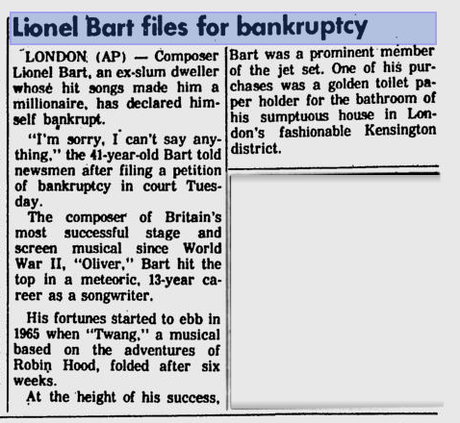
• Best Line
Bill Sykes to Nancy when she asks whether the rogue loves her or not. The black-hearted Bill’s reply? Salty, veiled but in no way coy: “I live with ya, don’t I?”
• Best Song
As Long As He Needs Me. And here’s Georgia Brown (another Londoner) giving it LARGE…
• The Exclamation Mark!
Oliver! So much more thrilling than plain-old Oliver. Every! Musical! Should! Have! One!
•••
The last clip (above) is of Georgia Brown on The Ed Sullivan Show on U.S TV in 1964. Back in 2014, to mark the 50th anniversary of The Beatles' arrival in the U.S, the Ed Sullivan Theatre where The Fabs made their American TV debut, replicated the marquee in tribute…
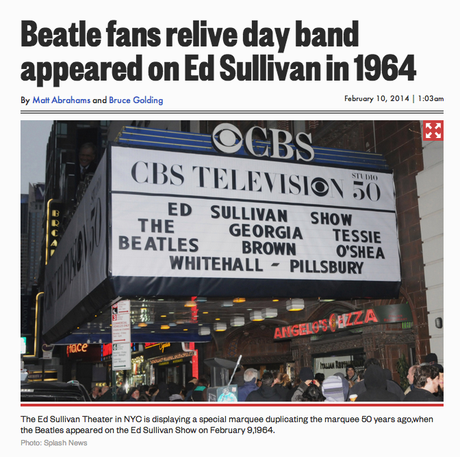
As you can see, the name Georgia Brown has equal billing with The Beatles – Brown was born Lillian Claire Laizer Getel Klot in London’s East End in 1933.
Brown was nominated for a Tony Award as Best Actress in a musical for her performance on Broadway. So, five English entertainers were named on the marquee that night in February 1964.
But a sixth was lurking somewhere down the bill, an 18-year-old from Manchester. Here he is…
… it’s Davy Jones, soon to be a Monkee, playing Artful Dodger.
Georgia Brown features prominently on my Women In Music 1722-2020 tour which I'll be taking out again later this year. Watch a preview HERE.
•••
To round-up, my top three Bart songs…
As Long As 'e Needs Me…
The showstopper from Oliver! And that's saying something in a show with such an embarrassment of riches in the score. Georgia Brown's version is from the original cast album. It's a voice that could knock yer hat off along the length of The Strand, true as an East End bell.
As stated above, Brown was born Lillian Claire Laizer Getter Klot into an East End Jewish family in Whitechapel in 1933. At the audition for Oliver! in 1960, Bart immediately recognised her as a childhood neighbor from the East End and cried out, "Lilly Klot!"
Who's This Geezer Hitler?
Parody of a wartime comedy morale song – and a very funny one at that.
If 'e was much littler/'e would disappear
'E's a nasty little basket wiv a black moustache/And we won't 'ave 'im 'ere!
It's from the musical Blitz! (the exclamation mark! Again!). In the same show Bart gives us The Day After Tomorrow, and Vera Lynn obliges on the vocal chores. Both songs are so faithful that they could easily have been written on Denmark Street as the bombs nearby hit St Giles Church on the night of the 9th October 1940.
Fings Ain't What They Used T'be…
More a play with music than an out-and-out musical, something more along the lines of Brecht and Weill than Rogers & Hammerstein, this title number from the show that transferred to the Garrick in the West End (with the rhyming slang lyrics translated in the programme notes!) was later covered by the wholesome entertainer Max Bygraves… with cuts made to the bits about hookers, criminal activity and barely-veiled threats of violence. What? Did he just whistle the tune, then? This version is the original cast recording (sorry, Max).
Do you have a favorite Lionel Bart song? Or a favorite musical with a London connection? As usual, drop me a line…
Keep In Touch…






